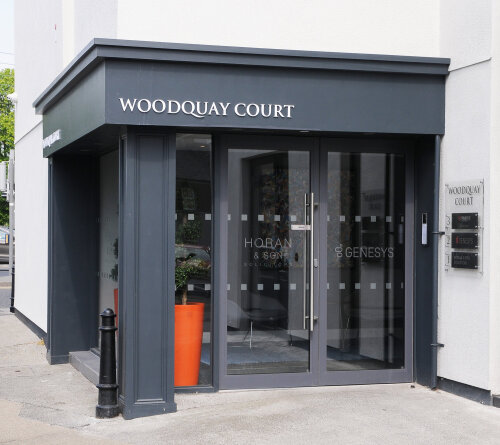Best Water Law Lawyers in Galway
Share your needs with us, get contacted by law firms.
Free. Takes 2 min.
List of the best lawyers in Galway, Ireland
About Water Law in Galway, Ireland
Water law in Galway, Ireland is a vital area of environmental and property law. It encompasses the legal frameworks and regulations governing the use, management, distribution, and protection of water resources within County Galway. This specialized field covers issues such as water rights, pollution control, water abstraction and discharge, flooding, drainage, fisheries, and the relationship between private landowners and public interests. Water within Ireland is under the stewardship of both national and local regulators, with Local Authorities and Irish Water handling most operational management in Galway. Statutory instruments, European Union directives, and the common law all play significant roles in regulating water use and protection.
Why You May Need a Lawyer
Seeking legal advice in the field of water law may become essential for a range of reasons. Common situations include boundary disputes related to waterways, flooding or drainage issues affecting your property, objections to local authority water-related decisions, compliance with water quality or discharge regulations for landowners or businesses, and representation in cases of water pollution or environmental harm. If you are facing enforcement notices, planning waterworks, managing agricultural land near bodies of water, or involved in freshwater fisheries, a lawyer specializing in water law can help clarify your rights and responsibilities. Legal advice is especially crucial when navigating complex licensing procedures, appealing decisions, or seeking compensation following water-related damage.
Local Laws Overview
Water law in Galway is shaped by several key statutes and local bylaws, incorporating both Irish and EU legislation. These include the Water Services Act 2007 and amendments, the Local Government (Water Pollution) Acts 1977 to 1990, the Environmental Protection Agency Act 1992, the European Communities (Water Policy) Regulations 2003, and regional Catchment Management Plans. Galway City and County Councils have responsibilities for local water management, issuing permits for abstraction or discharge, monitoring pollution, and supporting flood relief measures. Notably, Galway's abundant rivers, lakes, and proximity to the Atlantic require ongoing attention to water conservation, flood defenses, and sustainable use.
Frequently Asked Questions
What is water law?
Water law is the body of legal rules that govern the ownership, use, and management of water resources, including rivers, lakes, groundwater, and coastal waters. It includes issues such as public and private water rights, pollution prevention, and regulatory compliance.
Who is responsible for water supply and quality in Galway?
Irish Water is the national utility responsible for public water supply and wastewater services in Galway. Local authorities oversee certain water quality, flood risk management, and conservation functions, while the Environmental Protection Agency regulates adherence to national and EU water quality standards.
Do I need a permit for water abstraction in Galway?
Yes, if you plan to extract significant amounts of water from rivers, lakes, or groundwater, you typically need to obtain an abstraction license from the relevant authority. Thresholds and application processes are defined in law.
What should I do if my property is affected by flooding?
You should contact your local authority immediately, document the damage, and review your insurance cover. Legal advice can help if the flooding relates to inadequate drainage, planning decisions, or neighboring landowner actions.
Can I object to a discharge into a local river or lake?
You have the right to make representations or objections to proposed discharges by local authorities or private entities. Legal experts can assist in presenting evidence and arguments in administrative or court proceedings.
Is it legal to alter or divert a watercourse in Galway?
Altering or diverting a watercourse usually requires planning permission and may also need approval from fisheries or environmental regulators to ensure there is no harm to habitats or other users.
What can I do about pollution from agricultural runoff?
If you suspect pollution is entering watercourses from agricultural sources, report it to the local authority or the Environmental Protection Agency. There are strict regulations under both Irish and EU law, and breaches may result in enforcement actions.
How are water charges and rates determined?
Irish Water sets charges for domestic and non-domestic users, subject to oversight by the Commission for Regulation of Utilities. Charges are based on usage and connection types.
Who manages flood defenses in Galway?
Flood defenses are managed jointly by Galway City and County Councils, the Office of Public Works, and the National Directorate for Fire and Emergency Management. Landowners might also have certain responsibilities under law.
What is the process for resolving water-related disputes?
Disputes can often be resolved through negotiation or mediation, but may require formal legal claims through the District or Circuit Courts. A water law solicitor can advocate on your behalf and navigate resolution options specific to your circumstances.
Additional Resources
- Galway City Council and Galway County Council - offer information on permits, planning, and water services - Irish Water - provides guidance on domestic and commercial water supply issues - Environmental Protection Agency (EPA) - regulates water quality and pollution - Office of Public Works (OPW) - oversees flood risk and management - Citizens Information Centres - supply general legal and regulatory guidance - Inland Fisheries Ireland - for issues concerning fisheries and aquatic habitat protection
Next Steps
If you require legal assistance in water law matters in Galway, start by documenting your situation with photographs, letters, and official notifications. Identify the relevant authorities involved, such as the local council or Irish Water. Seek initial advice from organizations like Citizens Information, and prepare any questions you have. Consult a solicitor or law firm with experience in water law to discuss your case details, possible solutions, and the costs involved. Early legal advice can clarify your rights, help gather evidence, and guide you through applications, appeals, or enforcement procedures. Taking action promptly is often essential to protect your interests under Galway and Irish water law.
Lawzana helps you find the best lawyers and law firms in Galway through a curated and pre-screened list of qualified legal professionals. Our platform offers rankings and detailed profiles of attorneys and law firms, allowing you to compare based on practice areas, including Water Law, experience, and client feedback.
Each profile includes a description of the firm's areas of practice, client reviews, team members and partners, year of establishment, spoken languages, office locations, contact information, social media presence, and any published articles or resources. Most firms on our platform speak English and are experienced in both local and international legal matters.
Get a quote from top-rated law firms in Galway, Ireland — quickly, securely, and without unnecessary hassle.
Disclaimer:
The information provided on this page is for general informational purposes only and does not constitute legal advice. While we strive to ensure the accuracy and relevance of the content, legal information may change over time, and interpretations of the law can vary. You should always consult with a qualified legal professional for advice specific to your situation.
We disclaim all liability for actions taken or not taken based on the content of this page. If you believe any information is incorrect or outdated, please contact us, and we will review and update it where appropriate.













